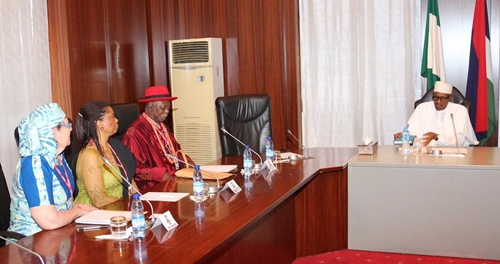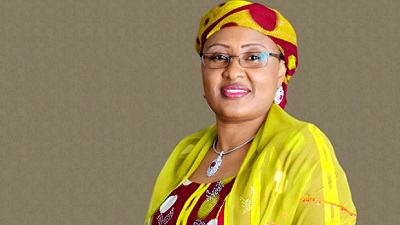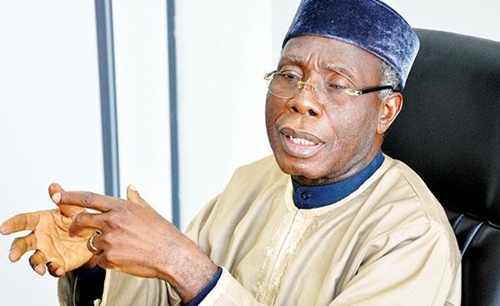
Human rights activist and lawyer, Femi Falana, has argued that Nigeria’s Constitution does not guarantee absolute freedom for the President, Vice President, governors and their deputies, against all forms of criminal acts.
The Senior Advocate of Nigeria (SAN), while speaking on the topic:”Limit of Executive Immunity,” at an event in Benin, Edo State, to mark the 60th birthday of the Secretary to the State Government (SSG), Professor Julius Ihonvebere, said there are Supreme Court decisions that said their immunity cannot be extended to certain criminal acts.
He berated those who criticised the freezing of the personal account of Ekiti State Governor, Ayo Fayose and the current prosecution of the leadership of the Senate over allegation of forgery.
He disclosed that the Supreme Court has also ruled that the Attorney-General of the Federation can direct the Attorney-General of a state to investigate allegation of public money being stolen in states, even if the money belonged to the state, because, according to him, the Supreme Court said at that time, the issue is about public fund that has been stolen.
“Apart from the President of our country, the Vice President, the Governors and their Deputies who are protected under immunity in Section 308 of the Constitution, others are now insisting that immunity be conferred on them.
“In particular, the legislators in our country are asking for immunity, but unfortunately, this is not the best time to make that request because right now, some of the leaders of the parliament in our country are standing trial for false declaration of assets, for forgery and conspiracy and some are even under threat of possible deportation to the United States to stand trial for rape and other related offences.
“The Governor of a state came and called Nigerians to join him to challenge the temerity of the EFCC for seizing an account that is suspected to belong to the Governor. The EFCC has quietly traced some stolen funds from Abuja and about N1.3b of that fund was traced to an account in Ekiti State with Zenith Bank.
“All that the EFCC did when it got information that this particular governor has surrounded the bank with armed gendarmes to forcefully remove whatever was left of that money from the account, the EFCC Chairman sent an order to the bank seizing the account and the EFCC went to court to obtain an order to legitimise the seizing of the account.
“As soon as the Governor learnt that the account has been frozen, he challenged that action of the EFCC on the ground that as a sitting Governor, he enjoys immunity, absolute immunity from arrest, investigation and prosecution and argued that the action of the EFCC was illegal and unconstitutional. I referred the Governor to the judgment of the Supreme Court involving Fawehinmi and the Inspector-General of Police.
“In the judgment delivered by Justice Uwaifo (retd), My lord subjected Section 308 of the Constitution to a serious intellectual scrutiny and concluded that the immunity conferred on the President and Governors by the Constitution cannot be extended to investigations if they are alleged to have committed criminal offences and of the three examples given by my lord, money found in an account of a Governor was one of them and he simply said assuming that a sitting Governor is accused of corrupt practices and money has been traced to an account which is suspected to have been stolen if it is not investigated and the account cannot be touched, the money is likely to be moved and by the time he is out of office, the money will have disappeared.
“He went further that if a Governor has his own car and that car killed somebody and you say that he cannot be investigated, the car may have been sold before the expiration of the term of office of the Governor. Therefore, investigation shall be conducted, the report may be sent to the House of Assembly for impeachment or the report may be kept until the governor will be out of office and he can be prosecuted.
“The Governor said this is not stolen money from Abuja. He said a bank, Zenith Bank, gave me the money for my election. If he maintains that position, he will be guilty of committing many offences under the law. N1.6 billion was taken from Abuja in cash. Nobody can take more than N2 million cash around, so that is against Section 1 of the Money Laundering Act. Number two; if he says that a bank gave him money to campaign, that means the bank stole depositors’ funds and laundered it for a campaign. Again, that is a serious offence under the Company and Allied Matters Act, because it specifically provided that no company, no corporate body shall deploy funds of the company for politics.
“So, if the governor maintains that, he will also contravene Section 90 of the Electoral Act which provides that no corporate body shall contribute more than N1 million to anybody for political campaign,” Falana said.
According to him, “just like the case of Abia State where immunity could not save the governor who was removed, and that of President Muhammadu Buhari over his certificate, there are certain category of offences that a sitting Chief Executive of the country or the state would not enjoy immunity.”
Commenting on the allegation of the forgery in the Senate, Falana said the Attorney-General of the federation was right in prosecuting the officials.
He said: “Section 4 of the Legislative Houses Powers and Privileges Act, forgery of the documents of the House of the Senate is a serious offence the Senate President or the Speaker is required under that law to report any forgery to the Attorney-General of the federation.
”But because it was not done in this case, the Attorney-General has decided to try them under the Penal Code applicable in the FCT.
“But what is the reaction of the Senate? It said this is political victimisation but has not said there is no forgery.”
Present at the occasion were Governor Adams Oshiomhole, the Minister of Niger Delta Affairs, Pastor Usani Uguru, who was the Chairman of the occasion, Speaker of the State House of Assembly, Elizabeth Ativie and other members of the state Executive Council.



































